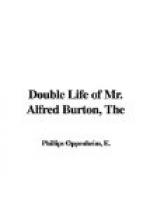“I have no doubt,” Burton murmured, “that I shall understand presently.”
“Once convince a man,” Mr. Bomford continued, “that you are offering him something which will improve his health, and he is yours, or rather his money is—his two and sixpence or whatever particular sum you may have designed to relieve him of. It is for that reason that you see the pages of the magazines and newspapers filled with advertisements of new cures for ancient diseases. There is more money in the country than there has ever been, but there are just the same number of real and fancied diseases. Mankind is, if possible, more credulous to-day than at any epoch during our history. There are millions who will snatch at the slightest chance of getting rid of some real or fancied ailment. Great journals have endeavored to persuade us that you can attain perfect health by standing on your head in the bathroom for ten minutes before breakfast. A million bodies, distorted into strange shapes, can be seen every morning in the domestic bed-chamber. A health-food made from old bones has been one of the brilliant successes of this generation. Now listen to my motto. This is what I want to bring home to every inhabitant of this country. This is what I want to see in great black type in every newspaper, on every hoarding, and if possible flashed at night upon the sky: ’Cure the mind first; the mind will cure the body.’ That,” Mr. Bomford concluded, modestly, “is my idea of one of our preliminary advertisements.”
The professor nodded approvingly. Burton glanced from one to the other of the two men with an air of almost pitiful non-comprehension. Mr. Bomford, having emptied his glass of claret, started afresh.
“My idea, in short,” he went on, “is this. Let us three join forces. Let us analyze this marvelous product, into the possession of which you, Mr. Burton, have so mysteriously come. Let us, blending its constituents as nearly as possible, place upon the market a health-food not for the body but for the mind. You follow me now, I am sure? Menti-culture is the craze of the moment. It would become the craze of the million but for a certain vagueness in its principles, a certain lack of appeal to direct energies. We will preach the cause. We will give the public something to buy. We will ask them ten and sixpence a time and they will pay it gladly. What is more, Mr. Burton, the public will pay it all over the world. America will become our greatest market. Nothing like this has ever before been conceived, ’Leave your bodies alone for a time,’ we shall say. ’Take our food and improve your moral system.’ We shall become the crusaders of commerce. Your story will be told in every quarter of the globe, it will be translated into every conceivable tongue. Your picture will very likely adorn the lid of our boxes. It will be a matter for consideration, indeed, whether we shall not name this great discovery after you.”




